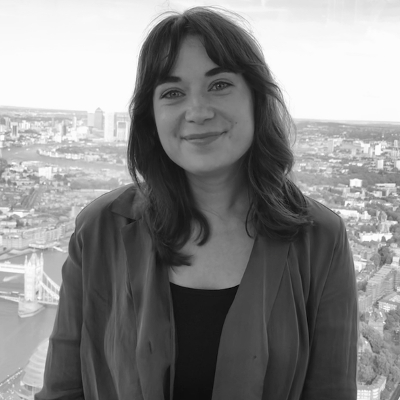Casas vacías, published by Kaja Negra in 2018 and translated by Sophie Hughes as Empty Houses, is the first novel by writer Brenda Navarro. In this book, she confronts the problematic situation of forced disappearances and the losses they involve, inviting us to reflect on motherhood and its various aspects. Born in Mexico City on February 26, 1982, Brenda represents a new generation of Mexican writers who have used cyberspace to question certain truths and the powers at play within the publishing industry. Her mission as a short story writer and novelist serves as an inspiration which both enriches and nourishes the literary scene. She directs the digital project Enjambre Literario and has a master’s degree in Women’s, Gender, and Citizenship studies from the University of Barcelona.
This is an excerpt from the conversation on the podcast Hablemos, escritoras, hosted by Adriana Pacheco.

Adriana Pacheco: You have a master’s degree in Women’s, Gender, and Citizenship studies, from a very prestigious program at the University of Barcelona. Tell us a little more about your background as well as your background as an economist and sociologist.
Brenda Navarro: It’s actually quite funny because I wanted to study sociology, but film studies. I had always wanted to narrate and it was difficult for me to know exactly how to narrate, which is why I thought I had to know the world, know how it worked. So I became a sociologist in that sense, but I realized that sociologists are kind of “all-ogists” and that in reality the world won’t change much. I ended up more frustrated than I was at the beginning. And when I started studying the world from the perspective of gender at UNAM is when I said, “Of course, this is where I belong, I want to keep studying everything that has to do with women’s issues, with gender, with human rights, etc.”
I came to Spain to learn how to give a different value to what I had learned in Mexico. In other words, it’s true that we have many deficiencies in our education system that should be better, that need improvement, there are lots of negatives, etc., but since I started the master’s degree in Barcelona I feel so grateful for the feminist professors I’ve had in Mexico, for the plurality of voices that I encountered at UNAM, and for the capacity we have for dialogue in Mexican society.
A.P.:. So tell us, how does your work come about? At what point do you feel the impetus to write and mix your voice with your own reflections on gender?
B.N.: I think it was all linked, there was no before and after. I’ve always thought that since I was little (and it seems a cliché to say that, I know, but it’s true, ever since I was little), because of my mother and my sister. They were super into pop music. And they listened to all this music by Marisela, Daniela Romo, and Amanda Miguel. I knew all their songs by heart. If you played them right now I could sing every word, but I didn’t relate to them. Ever since I was a little girl, I used to say, “Why do women only sing about these things?” And the first exposure I had to something different during my adolescence was Alanis Morissette, who in my opinion talked about other things, who was no longer the woman who suffered or was unfaithful, but an angry woman who also spoke up, who used irony to take on the world.
A.P.: You have a very interesting project related to this idea called Enjambre Literario. Tell us, where does it come from and where is it going? What’s the future for this project?
B.N.: Enjambre Literario first arose from the belief that women’s networks have to remain visible. Women have survived throughout history precisely because we know how to create networks, but we don’t talk about it that much and I think it’s important not to lose sight of this ability. Furthermore, in literary creation you know what it’s like to sit alone with a computer or with your notebook and lock yourself in your own world. So it’s not like you can go out and be with a group of friends and do other things, because you have to focus on yourself. Sometimes it seems like it’s a pretty lonely activity.
Then there’s the conflict with the scholarship or grant systems. They give the impression that you have to compete against other writers. And I like the idea of not having to compete, that we all have our own voice, we’re all different and what we have to do is generate networks to know exactly how we can collectivize our needs. That’s how the Enjambre started. I needed to talk to people because I had these concerns. I was lucky that Fernanda Melchor and Yuri Herrera believed that this could be something bigger and they helped me organize the first Enjambre call for texts (to be published digitally, which is something that interests me a lot) professionally. It worked so well we were able to publish a wonderful book by Sylvia Aguilar Zeleny, El libro de Aisha, and Tatiana Maynar, who also wrote a novel.
A.P.: Your first novel is Casas vacías (translated by Sophie Hughes as Empty Houses), a novel about forced disappearances and the impossibility of speaking about private things, published by Kaja Negra Editores. Tell us about this novel, which has been described as “uncomfortable,” and about the anxiety that I think it undoubtedly provokes in everyone who reads it.
B.N.: Empty Houses came about from another kind of questioning that wasn’t exactly about motherhood, as it has been for the readers. I started writing it in Mexico when this “non-war” was creating a lot of pain as well as a lot of disappearances, which are still occurring, but it was one of the first times we were living through something like this, that we were, let’s say, in the eye of the hurricane. And everything you heard, everything that was being said and discussed in the news, were the statistics of the people who had died or were missing and about the military, and little was said about the women. These women, mothers, who were traveling all over the country to find their missing children. And when I thought about it my heart ached, because I couldn’t find the right words. Because, I thought, how can a woman who is a Mexican mother, with all that being a mother in Mexico implies (many Mexican mothers are single moms or they are abused by their partners, or they are poor and have to work double or triple shifts)… how do they raise their children? And then they wake up one day to their child missing. They’re just not there in any tangible way, so they can’t mourn them. That’s how I started writing Empty Houses.
A.P.: Another issue that caught my attention was the immigration status of the girl.
B.N.: Yes, I think it would be helpful to clarify that the first version of Empty Houses had a different title, it was originally called Los pájaros se estrellan en el cielo (or in English, “the birds crash in the sky”). That first version of the book wasn’t so focused on the theme of motherhood, I actually changed the second part completely. And I changed it when I was already living in Barcelona and had given birth to my second daughter. I had to go through motherhood completely alone, without any network. My first daughter was like every daughter in a Mexican family, with grandmothers, grandfathers, aunts and uncles all around, so raising my first daughter seemed really easy to me. I did lose a lot of things in many personal ways, not as a woman but because of my life story, but it wasn’t hard for me to be a mother. It was a very social thing. But with my second child it was difficult precisely because of this, because I was a person who didn’t have social networks in Barcelona, because I was alone with my partner and because I didn’t know what to do with a baby. I knew in theory, but even when I had her there I was really scared and had to face a lot of my fears.
When I went back to writing the novel to have it published, I said to myself: “I’m not going to talk nonsense,” which was kind of like romantic love. And I also said, I have to get all this on paper, all of these things that are the reason I feel like a single mother. There’s a TV show that you probably know called Six Feet Under, and in one of the last episodes the character named Ruth tells her daughter-in-law, “If my experience is anything to go by, motherhood is the loneliest thing in the world.” This really stuck with me, and when I did live through it completely alone, I said, of course, we live totally in solitude because we put on the appearance that since we are mothers we know how to do everything.
A.P.: What are your next plans, what are you working on now? Where is Brenda Navarro going?
B.N.: Right now I’m writing a novel in which I’m asking myself, what is forgiveness? And for what? It’s about women, of course. I’m trying to find another kind of voice to avoid repeating myself, but one that is still intimate and that can continue to speak to those who want to get closer. I’m going to talk about a rather uncomfortable topic: what is forgiveness, and also what does forgiveness have to do with militarization. I’m trying to think about all of this without having to talk explicitly about militarization. It’s a big challenge for me. Dehumanizing the people who were forced to join the military leads us to the kind of confrontations that we are experiencing now. That’s what I’m working on. I want to finish writing it this year and we’ll see when it comes out. I’m not in a hurry, it will come out whenever it’s ready.
A.P.: Perfect, congratulations. I think when you were younger you must have been like one of my granddaughters, for whom everything is why, why, why? Everything you do is rooted in your curiosity and your questioning of the world. Well, Brenda, I’m sending you a really big hug from Texas. I wish you all the best and thank you again.
B.N.: Thank you so much and we’ll keep in touch; sending you a kiss.
Translated by Kathleen Meredith
You can hear and read the complete interview in Spanish on the Hablemos, escritoras website.



